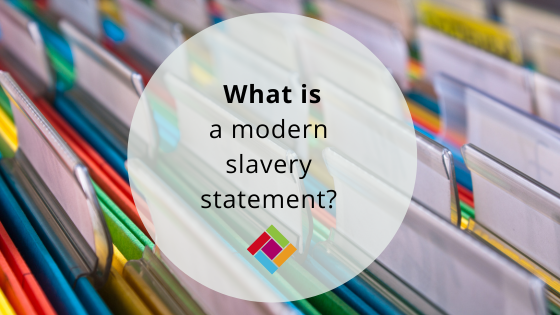
A modern slavery statement sets out the steps organisations are taking to prevent modern slavery in both their businesses and supply chains. It is required by certain commercial organisations under The Modern Slavery Act 2015.
Do small businesses need a modern slavery statement?
Businesses with a turnover of under £36 million are not required to publish a statement. However, those with service contracts or who are part of a larger supply chain would be advised to look into it. Larger organisations would seek this information from suppliers typically as part of their due diligence. Therefore, the lack of a modern slavery statement could impact future business prospects.
There are other benefits for small businesses to produce a modern slavery statement which include:
- Future tenders with large organisations who want to see suppliers addressing this issue.
- Increased brand reputation shows your business takes the issue of modern slavery seriously and is taking steps to ensure it does not play a part.
- Compliance within the business’s own supply chains (for example using temp agencies or office service providers).
- Compliance with the law would assist with any future growth plans.
What is modern slavery?
According to the Modern Slavery Act 2015, modern slavery can include:
- Debt bondage
- Human trafficking
- Forced labour (through threats carried out physically or mentally)
- Employers controlling or ‘owning’ employees with actual or threatened abuse (mental and physical)
- Being traded as a property or commodity
- Having constraints placed on movement or being physically constrained.
Who is required to publish a modern slavery statement?
The requirements for organisations to publish a statement is based on the following criteria:
- It is a ‘body corporate’ or partnership, wherever incorporated or formed
- It carries on a business, or part of a business, in the UK
- It supplies goods or service
- Has an annual turnover of £36 million or more
However, it is down to the organisation to determine whether the legislation applies to them. For more detailed information on criteria see the government guidance.
What should a modern slavery statement include?
The government states that ‘organisations are not expected to guarantee that all their supply chains are slavery-free. However, statements must describe the steps the organisation has taken during the financial year to deal with modern slavery risks in the supply chain and the business.’
So even if a business hasn’t taken any steps to deal with the risk of modern slavery, it must still publish a statement explaining this.
The Home Office recommends that the following six areas are included in a statement:
- Organisation structure and supply chains
- Policies held in relation to slavery and human trafficking
- Due diligence processes
- Risk assessment and management
- Key performance indicators to measure the effectiveness of steps being taken
- Training on modern slavery and trafficking
What are the obligations?
In order to meet the legal requirements around a modern slavery statement, you will need to:
- Publish it on your UK website with a link placed somewhere prominently on the homepage.
- The statement must be updated every year. This means assessing the criteria each financial year to ensure your organisation is still meeting the standards.
- The statement will need board approval with a date.
- Add it to the government registry which provides a database of modern slavery statements.
Are there any HR policies should the business have in place to align with the modern slavery statement?
In order to minimise the risk of modern slavery and human trafficking within the company and supply chain, it is advised that the businesses also implement the following policies and procedures:
- Whistleblowing policy: encouraging all workers, customers and
other business partners to report any concerns related to the direct activities, or the supply chains of, the organisation. This includes any circumstances that may give rise to an enhanced risk of slavery or human trafficking. The whistleblowing procedure and training should be designed to make it easy for workers to make disclosures, without fear of retaliation.
- Employee code of conduct: outlining the standards of employee conduct and ethical behaviour when operating abroad and managing business interactions and supply chain.
- Procurement code of conduct: ensuring that suppliers adhere to the highest standards of ethics. Suppliers should be required to demonstrate that they provide safe working conditions where necessary, treat workers with dignity and respect, and act ethically and within the law in their use of labour.
- Recruitment/Agency workers: the business should only use specified, reputable employment agencies to source labour and always verifies the practices of any new agency it is using before accepting workers from that agency. This includes checks that all workers have the appropriate right-to-work documents and ensure that they are paid fairly and enjoy a competitive remuneration package.
We would advise any businesses to seek help before publishing a modern slavery statement. Get in touch if you would like to know more.